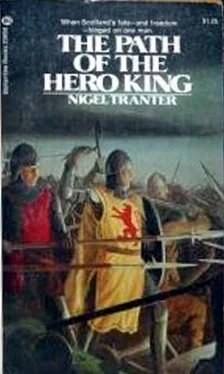Shades of Glen Trool indeed-save that here everything was magnified many times.
All the royal camp had been active since dawn, but for the last hour or so the King had stood alone, silent, apparently fascinated by that yawning chasm to the west, preoccupied to a degree, staring just staring. His leaders brought him reports, from scouts, of the readiness of the various companies, and he accepted these with mere nods, scarcely seeming to hear. Men eyed him almost as much askance as they eyed what Campbell had called the jaws of hell.
James Douglas came to speak, at length.
All is ready, Sire.
Fourteen hundred of the youngest, noblest Highlanders, in four companies-under the MacGregor, the Mackintosh, MacDonald of Lochalsh and Sir Ranald MacRuarie. With 200 light bowmen.
All stripped to the lightest. Waiting.
Bruce looked up towards the mountain-tops, still shrouded in the white night-caps of fleecy mist, tinged golden now with the early sun.
How long before those mists clear, Neil?
Two hours yet. At this season.
And the wind? It will freshen?
Campbell, whose castle of Innischonell was less than a dozen miles to the south, shrugged.
About the same time. I cannot give you any certain hour, Sire. But, with this weather, the mounting run draws the wind off the sea and up the hillsides. It is a thing we have to beware when we stalk the deer. It is partly this wind which blows away the thinning mists from the tops…
So the wind first? Not a breath of wind now stirred the quiet morning.
Yes. Or so is usual.
Then let us pray this is such a day! So be it. Off with you both. You have only two hours-and this must be timed most closely. The King held out his hand.
The day depends on you both. Yours is the most dangerous part, Neil my friend. With no knightly glory! But all rely on it Your people have all the flints and under? Jamie-your greatest task will be to hold back the rash.
After your great climbing. Watch for it Go, then-and God be with you…
So back eastwards along the loch side the four companies marched off, into the dazzle of the sun; and any MacDougall scouts and lookouts posted in vantage positions to the west could not but assume retiral, or possibly some regrouping to attempt a crossing of the loch by boat farther south.
But, round a thrusting shoulder of the mountain, out of sight from the west; the Falls of Cruachan came crashing down in foaming white water, in a series of great steps and stairs, from the lofty and vast corrie cradled amongst the topmost peaks of the mountain.
Through the centuries this cataract had worn a deep and steep ravine for itself. Up into this the eager bands of Highlanders turned, and began their tremendous climbing.
Bruce waited, anxiously watching the clinging mists that wrapped the summits above some 2,000 feet. If that cover were to lift too soon … He gave them a trying, uneasy ninety minutes; and then, with the mists most evidently thinning and retreating, he marshalled his residual forces and gave the order to advance westwards, towards the pass, remaining armour at the front. They did not hurry.
The increasing narrowness of the track elongated the column grievously, inevitably. Gradually the towering jaws of the defile closed in on them. Word came back from forward scouts that small enemy pickets were retiring by stages before them. They would draw the invaders on, to the timber barricade a mile deep in the pass, as Bruce had drawn Clifford at Glen Trool.
The first stirrings of air reached them as they entered the gorge.
In a little while there was a distinct breeze from the west, in their faces. With a sigh of relief the King halted his long column about half a mile in.
Mens noses caught the tang of burning before ever their eyes
perceived the thin blue film of smoke ahead. Quickly that film darkened, however, and soon it was not blue but murky brown, until great billowing clouds of it, growing ever thicker, swept up the pass on the westerly wind. Neil Campbell and his company had played their part. Having climbed most of Cruachan, and descended beyond, they had fired all the heather and bracken hillside at the western entrance of Brander, and the pass was now acting as a vast funnel or flue.
Streaming-eyed, blinded and choking in the acrid flood, Bruces force still waited. Now it was their ears turn. All listened.
It was not easy to hear, for sound does not carry downhill so readily as up, and the sullen roar of the river was close at hand. But presently, high and thin, those keenest of hearing could discern the yells and shouts and clash of battle, far up above them. Douglas and his three companies had hurled themselves down from the very mountain-tops, out of the mists upon the waiting MacDougalls halfway up the hillside. Campbell would now be moving back to aid them. And Angus Og might well be making his presence felt farther west still.
The King again ordered the advance, slowly, into the smoke.
Soon they overran their scouts, who warned that the barricade was just ahead, around a bluff. Warily the armoured men moved in.
However bewildered by the smoke, and the obvious trouble above, the enemy here had not deserted their post. They had no warning of the invaders approach however, with the smoke, and the first of the royal troops were clambering over the timber obstructions, swords and battle-axes poised, before the alarm was shouted.
Wild and bloody fighting followed, incoherent, unsophisticated to a degree. Tight-lunged, stinging-eyed men hacked and slashed and battered blindly, Bruce himself in the forefront, wielding a mace for this hit-or-miss warfare. But the defenders were massively outnumbered, and in only a few minutes the position was won.
The Kings men pressed on along the pass, the smoke thick as ever.
One or two boulders and the occasional shower of smaller stones did come down on them from the obscurity above, but these were scanty enough to do little damage. Undoubtedly up there men were too busy fighting for their lives to concern themselves with the stone-rolling tactics. Sometimes, indeed, a body it was that came hurtling down-and these were not always MacDougalls. The Battle of Brander was being fought up on Cruachan, not in the pass.
There were two more barricades to negotiate. But the first was deserted and the second but half-heartedly held, the defenders not unnaturally conceiving the situation to be desperate. For now the sounds of fighting could be heard directly ahead, and low as the track level, presumably from the western mouth of the pass, the MacDougalls were looking as anxiously back as forward.
The smoke was beginning to thin. Sore-eyed, Bruce led his force cautiously on.
That, in fact, for the main body, was the last of the fighting.
Presently they could sense the fierce sides of the defile to be drawing back, opening, even though they could not actually see it. Then, where the track bent, to cross a spidery timber bridge over a sudden narrowing of the river, they came across many bodies, dead and wounded. The marks of axes on the bridge timbers told the story. Some of the casualties were MacDonald isles menthe crews of Angus Ogs galleys. They had saved the bridge, anyway.
Soon after, with an abruptness that was startling, and painful to streaming eyes, Bruce strode out of the mirk and constriction, into sunlight again and wide, colourful vistas. Blinking, bemused, he and his stared around them.
They had passed the wide belt of burned heather hillside, which now stretched upwards, to their right, in blackened, smouldering ruination, the flames dying away as they reached the rocks of the defile proper. In front, the wide basin of Etive, with its glittering waters, opened out. Those waters were positively littered with shipping, galleys, some beached, some lying out, some maneuvering, some apparently fleeing down-loch with others in pursuit. And along the south shore a running fight was proceeding westwards, most clearly at speed.
Читать дальше












